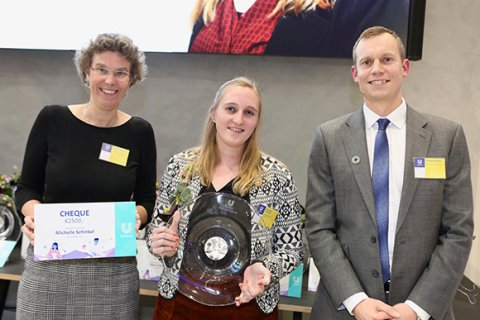Master student Michelle Schinkel wins Unilever Research Prize 2019

Michelle Schinkel, Master student of Molecular and Cellular Life Sciences, wins one of this year’s Unilever Research Prizes. Each year, Unilever presents this prize to 13 Master students who have done excellent research related to the UN Sustainable Development Goals. During her research internship, Schinkel studied fungal infections. People with a weak immune system are highly susceptible to these, and only four types of fungi are responsible for 1.5 million deaths per year.
Schinkel studied in great detail how the infectious particles of Aspergillus fumigatus, the spores we all inhale every day, resist being killed by our immune cells. Her research revealed a new strategy of this fungus and she discovered that very specific small molecules in the spores actually provide protection against reactive oxygen species. These small fungal molecules can be future targets for new medical treatments to fight fungal infections.
Publication
Schinkel’s research was highly multidisciplinary and included both mycology and chemistry. In her research, Schinkel proved to be a very skilled, creative and independent scientist. According to her supervisor, Hans de Cock (Molecular Microbiology), Schinkel belongs to the top 10% of students. Her contributions to research during her Master’s led to publications in Medical Mycology and the European Journal of Pharmaceutics and Biopharmaceutics.
Molecular and Cellular Life Sciences
Earlier this year, two other Molecular and Cellular Life Sciences students also won awards. In March, Felix Kümmerer received the Vliegenthart thesis prize for his research on the effects of potassium channels in living cells. In November, Hugo Damstra received the Pfizer Prize for Life Sciences for his research on the dynamics of the cytoskeleton of T lymphocytes.
The Molecular and Cellular Life Sciences Master's programme is research oriented and takes a multidisciplinary approach to study related to health and disease in cells and organisms.

